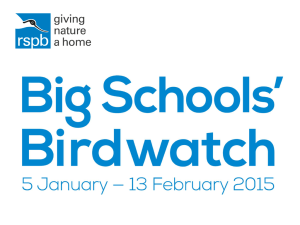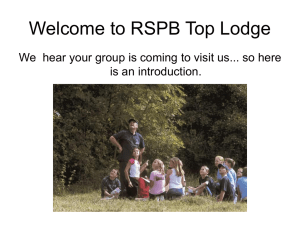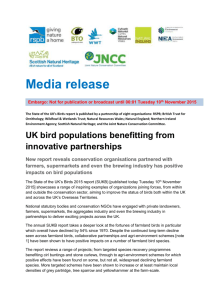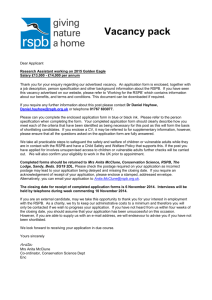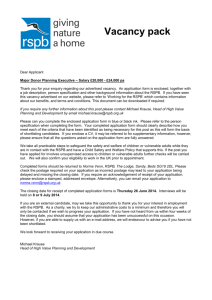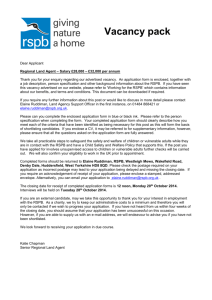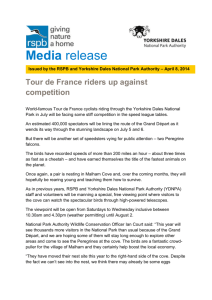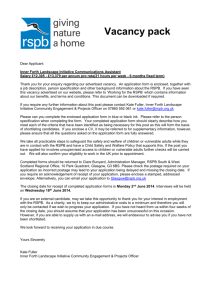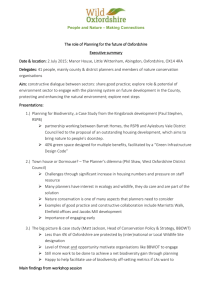Word version
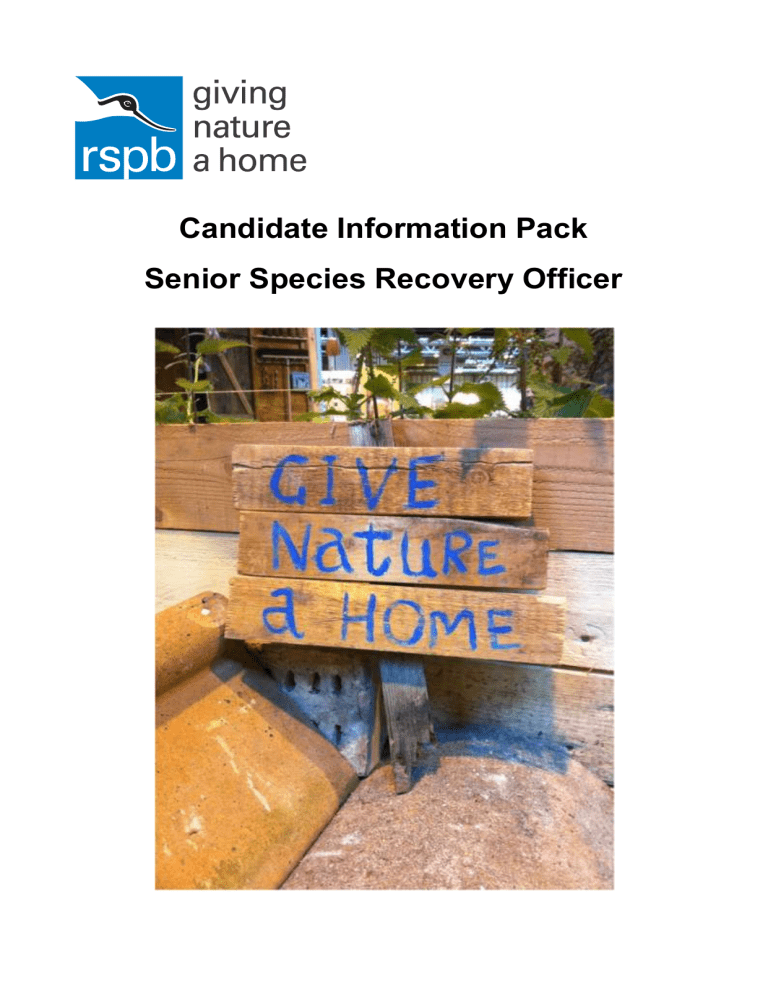
Candidate Information Pack
Senior Species Recovery Officer
JOB DESCRIPTION
Senior Species Recovery Officer Job Title
Purpose of Job To directly deliver and/or oversee the delivery of key work areas to achieve our species & habitat conservation objectives consistent with the wider RSPB strategy
£27,000 - £32,000 Salary Range
Dept/Reserve
Primary Work Base
Line Manager
Reportees
Main Duties
Species and Habitats Conservation
The Lodge, Sandy
Head of Nature Recovery Unit
Up to three Species Recovery Officers/ Project Managers
1. To play a lead role in facilitating the implementation of the RSPB’s UK species and habitats recovery programmes, especially Milestones 1a and 1b of our corporate strategy ‘Saving
Nature’. This will be achieved through cross-organisational working, excellent communication, working closely with external partners and strong leadership.
2. To manage one or more major species recovery projects.
3. To lead on implementing Species Action Plans for an agreed suite of priority species and habitats through co-ordinating and facilitating internal staff working groups (Nature Recovery
Groups).
4. As Species Lead for agreed species, to implement actions and monitor progress towards agreed targets. This includes maintaining an overview of RSPB work, sharing best practice and ensuring that species requirements are incorporated into land-use policy advocacy; convening meetings as needed; representing RSPB at meetings, conferences, workshops; report preparation; media work.
5. To assist the Senior Species Recovery Officer responsible for annual monitoring to compile the Annual Ends Monitoring Report to Council.
6. To work closely with colleagues across the Society to co-ordinate work programmes in order to achieve the best possible outcome for conservation. This includes staff in Conservation
Science, Advisory, Reserves Ecology, Futurescapes, Agricultural, Marine and Species
Policy, Country and Regional Conservation and Reserve Managers, Fundraising and
Communications.
7. To work with external colleagues at all levels up to and including Directors of other NGOs.
8. To deputise for Head of Section as required.
9. To fundraise against specific projects where appropriate.
10. To set and manage project budgets of up to £100,000 pa.
11. To present the work of the Nature Recovery Unit to management, including Conservation
Programmes Team, Operations Management Team, Scottish Management Team, Board and Council as appropriate.
12. To help set priorities for RSPB’s species conservation work and ensure they are adhered to.
Other Duties
1. To support the HoS in the development and management of the Nature Recovery Team and to assist colleagues with their work programmes where appropriate.
2. To contribute to the evolving strategic thinking around how best to prioritise, coordinate and implement our species recovery work.
3. To seek opportunities to gain profile for the RSPB’s role in delivering conservation action for agreed priority species and habitats, through RSPB communications, national and local media and the internet. This includes publishing peer reviewed papers where appropriate.
4. To act as an ambassador for species recovery work and the RSPB and to share best practice through publications and presentations.
5. To troubleshoot and resolve conflict situations within partnership working both internal and external.
6. To write and review project plans and species action plans as required.
7. To comment on external policy documents and make recommendations on behalf of the
RSPB.
8. The post will require periodic travel throughout the UK and occasional nights away from home.
Partnership Information
The role will involve working with existing and new partnerships. Forging and managing partnerships with other organisations to fund raise for and deliver joint species recovery projects will be a core part of the job.
PERSON SPECIFICATION
PLEASE ASSUME REQUIREMENT IS ESSENTIAL UNLESS STATED AS DESIRABLE
Education/Qualifications
First Degree in ecology or conservation
GCSE or equivalent in English and Maths
Higher degree in related subject
Knowledge
Desirable
Detailed knowledge of practical conservation delivery enabling them to understand, interpret and advise external experts in their work area on how to support our species & habitat conservation objectives
Detailed knowledge of natural history enabling identification of priority species and habitats, understanding of their ecological needs and practical conservation response, within their work area
Knowledge of the ‘recovery curve’ approach to species conservation
Knowledge of the ‘toolkit’ of conservation measures deployed by the
RSPB
Skills
Excellent written and verbal communication skills
Proven ability to demonstrate successful time-management and organisational skills
Proven ability to develop and maintain successful partnerships and working relationships to deliver key result areas
Able to prioritise effectively
Project management and implementation
Skilled use of Microsoft Office and associated software
Taxonomic, identification and practical field skills appropriate to the post
Experience
Proven experience delivering and/or managing practical conservation work within a relevant work area
Successful project management demonstrated by delivery of stated objectives, within budget and on time.
Staff management (2 years or more)
Budget management
Project development
Desirable
Other
Confident and capable of being a public face for RSPB to specialist audiences, as well as general audiences via the media
Additional Information
The RSPB works for a healthy environment for all and we therefore expect you to take action in accordance with our Environmental Policy and objectives. Together we can make a positive difference for our world.
You will be expected to apply ‘sound value for money’ principles in undertaking purchasing or supply of goods and services.
In the RSPB volunteers are a major resource and make a vital contribution to the RSPB’s aim to take action for the conservation of wild birds and the environment. You will be expected to encourage, develop and support volunteer involvement in our work.
How we expect you to work
The RSPB has seven key competencies that are important to our organisation’s success. We expect all employees to demonstrate the following behaviours in everything that they do:
Direction:
You ensure you have a clear direction and sense of common purpose that guides what you do and how you approach your work.
Energy:
You bring energy and urgency to the RSPB to motivate people to do the best they can.
Capability:
You build your own and other people’s capabilities, directly and indirectly.
Relationships:
You communicate effectively and build productive internal and external relationships.
Change:
You support continuous improvement and change and constantly look for way to do things better.
Advocacy:
You act as an advocate for the RSPB.
Performance:
You get things done, achieve ambitious goals and the RSPB’s aims.
How to Apply
We would invite you to complete the application form at the end of the pack and send it on to Diane James at diane.james@rspb.org.uk
If you have questions about the role please contact Andy Evans by email andy.evans@rspb.org.uk or by telephone 01730 892601.
Please take care to ensure you clearly detail how your skills/knowledge/experience demonstrates you are able to deliver on the key result areas, remove the role information and only send the application.
Our policy is to recruit and employ our employees on the basis of their suitability for the work to be done. An application form allows us to compare individuals based on like for like information and as such we would not accept a CV for this role unless accompanied by a fully completed application.
31 July 2015 Closing Date
Interview Date 19 August 2015
Who we are and what we do
The RSPB exists to give nature a home. We help our birds, other wildlife and natural places survive and thrive.
On our doorstep are woods and farmland, moors and marshes, cliffs and mountains. They are home to an astonishing array of precious but threatened wildlife. Every species is unique, but they are all connected to one another. And every one of them needs a home to survive.
Sadly, many of our best loved and most iconic species can’t find a welcome home here any more.
It ’s our job to change this. A country that’s not home to skylarks and puffins, red squirrels and hedgehogs is not a country any of us want to live in.
To protect our threatened birds and other wildlife, we need to protect the places where they live. If we are taking care of nature, we are taking care of ourselves and future generations.
The RSPB in a nutshell
The Royal Society for the Protection of Birds (RSPB):
Was formed in 1889 to counter the barbaric trade in bird plumes for women’s hats
Has since grown into a world-leading wildlife conservation organization and now speak out for all birds and wildlife, tackling the problems which threaten our environment
Has over a million members, including more than 200,000 youth members
Has more than 2,000 active staff members and almost 18,000 volunteers, who donate more than a million hours of their time – that’s the equivalent of 600 full-time staff
Has a NET income available for charitable purposes of £89.3 million
Has more than 200 nature reserves covering 143,7800 hectares and home to 80% of our rarest or most threatened bird species
Has a UK headquarters, three national offices and eight regional offices
Has a network of over 150 local groups and more than 150 youth groups
Has an impressive global reach, with active projects and capacity building programmes in 26 countries and 8 UK Overseas Territories
Is the UK partner and leading player, in Birdlife International
Has the largest charity mail order operation in the UK, and also has the UK’s most successful charity credit card
Volunteers
Volunteers founded the RSPB 125 years ago and remain a vitally important part of the organization today; there are approximately nine volunteers for every paid member of staff
Our volunteers bring a unique range of skills and qualities to the RSPB, help stretch our scarce resources and keep us in touch with grass roots.
Our Strategy, Mission and Cultural Values
Our Strategy
Our vision: a world richer in nature
Imagine this. Wild birds and other wildlife will no longer be declining. Nature is restored, enriching and sustaining the lives of people as a result. Such a world would guarantee that future generations have clean air and water, a stable climate, abundant and diverse wildlife, and a robust, diverse and sustainable economy.
Our long-term purpose: saving nature
We believe that:
There is a moral imperative to save nature
Nature is crucial for peoples quality of life and the planet ’s life support systems
Birds are an integral part of the web of life
We are well placed to stand up for birds and all nature
The challenge is great, we must work with others to succeed
We need growing popular support
Our Mission
By 2020
Our work is both urgent and important and we need to act now to make a difference. The world ’s governments have committed to halting biodiversity loss by 2020 and we will challenge them, as well as businesses, civil society and ourselves, to take the steps necessary to reach this goal, and then go further.
Our Cultural Values
Our cultural values are the way we work with each other and partners:
Bold
We speak out honestly for what we believe in, aiming higher and pushing further for growth. We seek to provide innovative, fun and sociable ways for people to get involved
Focused
We identify where birds and wildlife are most under threat, then act decisively and with commitment to save them and deliver tangible results
Supportive
We support each other and our sector partners in order to flourish, and make sure our supporters receive reward and recognition for their contribution
Together
We work together for the biggest possible impact across the RSPB and with partners across the UK and globally
.
Working at the RSPB
Hours of work
Normal hours of work for full-time employees are 37.5 hours per week. We are introducing new Flexitime and
TOIL frameworks to recognise the commitment of staff and their willingness to be extremely flexible in the interests of conservation and the organisation, with the aim of making flexibility available to as many people as possible.
Leave entitlement
Holiday entitlement in a full year is 26 working days, four of which must be taken during the RSPB’s
Christmas shutdown. Public holidays (or days in lieu) are additional to annual leave. Long serving staff receive additional holidays:
3 years continuous service 28 days
7 years continuous service 30 days
Part-time staff (which includes part-year staff) are entitled to a pro-rata number of days annual leave.
The RSPB prides itself on being a flexible and supportive employer. We have a range of options available to support our employees including parental, family, and special leave alongside our maternity and paternity leave arrangements. More details of entitlements when working at the RSPB can be found on our intranet page.
Payment during sickness absence
The RSPB operates an Occupational Sick Pay Scheme (OSP) in parallel to Government Statutory Sick Pay
Scheme. OSP allowances are determined by length of service from 30 days (6 weeks) in your first year up to
180 days (30 weeks) after 5 years service
For part-time employees, OSP is based on the number of days worked per week and paid at the normal parttime rate.
Learning & development
The RSPB is committed to supporting new employees. We offer a wide range of learning and development opportunities including on-going training, e-learning and through our induction process.
We have a long standing commitment which has survived the economic downturn, to providing quality learning and development opportunities. We prioritise leadership and management which is key to people motivation and success. Our recent leadership programmes have received the Institute of Leadership and
Management accreditation.
The Learning and Development team ’s focus and aim is to aid the organisation to succeed.
The RSPB is currently going through a job evaluation review. We just wanted to let you know that all jobs are subject to this review, including our current job vacancies. The results of the job evaluation review and the new payband structure will be implemented across the RSPB later in 2015 and you will be kept fully informed of the outcomes.
Staff benefits
Pension
The RSPB operates a defined benefit pension scheme, called a cash balance scheme. Both members and the RSPB make contributions to the scheme and the RSPB bears the administration costs of running the scheme. The RSPB’s cash balance scheme is contracted in to the State Second Pension.
Flexitime
The RSPB operates a flexitime system.
Childcare Voucher Scheme
The Childcare Voucher Scheme is open to all employees who are parents or guardians and currently use childcare facilities. Employees can opt to receive part of their salary in childcare vouchers up to a maximum of £243 per month to use with a wide range of childcare providers. The amount received in vouchers is tax free.
Green loans
Employees can apply for an interest-free loan to buy a bicycle or a season ticket.
Free entry to RSPB Nature Reserves and discount on RSPB retail items
Employees can visit any RSPB reserve free and can receive up to 20% off retail items in the RSPB ’s shops.
Staff Association
The Staff Association is the official, independent body that exists to protect and promote the interest of its members, to represent their views and to act as a consultative body. It is officially recognised and supported by the Management Board and Council as the formal channel for the communication of staff views. All employees are eligible to join the Staff Association.
Sabbatical leave
For every seven years continuous service from the date of joining and each seven years thereafter, all employees are eligible to apply for a sabbatical. We give a maximum of four weeks paid leave.
Life Assurance
All our staff are automatically covered for death in service benefit. This cover is not conditional on becoming a contributory member of the RSPB pension scheme. A lump sum of three times their pensionable salary at the date of the employee’s death is paid to their beneficiaries or estate.
Relocation policy
We are able to offer a limited amount of financial help towards relocation costs for employees, depending on the circumstances.
Environmental Statement
We have a role to play in protecting our environment by being as ‘green’ as possible. As a conservation organisation, we know a healthy environment is critical for nature and that we need to lead by example.
Through our environmental management system (EMAS), we have an Environmental Policy, objectives and targets which prioritises where we can do most. All staff members are asked to respect and adhere to our green principles
Equality and Diversity at the RSPB
The RSPB is part of a global network that incorporates a diversity of traditions and cultures, and which represents different inheritances, backgrounds, influences, perspectives and experiences. A better understanding of people’s differences will help us to appreciate and value everyone’s contribution, and recognise that we are all an integral and invaluable part of the RSPB.
Everyone has the right to be treated with consideration and respect. The RSPB is committed to achieving a truly inclusive environment for all, by developing better working relationships that release the full potential, creativity and productivity of each individual, and an atmosphere where everyone can learn, work and live free from prejudice, discrimination, harassment and violence.
The RSPB aims to ensure that all staff, volunteers, partners, clients, contractors, members and the general public are treated fairly. Unless it can be shown to be justified, this will be regardless of sex, sexual orientation, gender re-assignment, marital or civil partnership status, race (including colour, nationality, ethnicity, or national origin), disability, medical status, age, religion or belief, political opinion, social or economic status, or ex-offender status.
Employment Checks
All offers of employment are made subject to the following criteria:
Proof of eligibility to work in the UK, Satisfactory Employment Health Check, Two references satisfactory to the RSPB and where required a Satisfactory Criminal Records Bureau Check.
Applications from candidates requiring a certificate of sponsorship under the UK points-based immigration system will not be considered if there are suitable candidates who do not require sponsorship. This is because employers need to demonstrate that they are unable to recruit a resident worker, before they can recruit a non-resident worker*.
The resident worker rule does not prevent applicants requiring sponsorship from applying for our vacancies, but such applications should be made on the understanding that they can only be considered subject to the restrictions above.
For further information, please visit the Home Office UK Border Agency website.
*This rule does not apply to those applying for roles that require a bachelor, postgraduate degree or postgraduate certificate in education qualification. It is necessary for the qualification to be an essential requirement for the role and the applicant to prove that they possess such a qualification (or have completed a minimum of 12 months study in the UK towards a UK PhD), which is recognised in the UK.
APPLICATION FOR EMPLOYMENT
STRICTLY CONFIDENTIAL
PLEASE REFER TO VACANCY DETAILS FOR RETURN ADDRESS
Job Ref. No. A1400615
Position applied for
Location
How did you first learn of this vacancy?
Identification details
(BLOCK CAPITALS PLEASE)
Surname
Forenames
Address
Dr/Mr/Mrs/Miss/Ms/Other
Postcode
Email address
May we, with discretion, phone you at work?
Home tel no
Yes No
Business tel no
Do you hold a current, valid driving licence?
If yes, what type?
If yes, do you have any current endorsements?
If yes, please give details of any current endorsements.
Yes
Full
Yes
No
Provisional
No
Qualifications relevant to this application (including technical and/or professional).
Please provide details (note that these may be verified on appointment)
Current membership of any professional or technical organisations.
Please provide details (note that these may be verified on appointment)
Employment history
Please give details of all jobs held, including part-time and unpaid work, starting with your current or most recent employer.
Continue on a separate sheet if necessary.
Employer’s full name & address
Job title/
Key achievements & areas of responsibility
Length of time in job/
Reasons for leaving/
Final salary in role
Relevant skills/knowledge/experience
You should outline below how your skills/knowledge/experience meet the requirements of the role profile. You may draw on past employment and/or out of work activities. Please include details of any scientific papers you have had published. Continue on a separate sheet if necessary.
The Royal Society for the Protection of Birds (RSPB) is a registered charity: England and Wales No. 207076 Scotland No.
SC037654
Why are you interested in applying for this post?
Continue on a separate sheet if necessary.
Length of notice
Declaration
The information on this form will be used for recruitment and selection purposes only and if your application is successful it will form part of your employment record. All unsuccessful applications will be destroyed twelve months after the closing date for positions advertised in Scotland, England and
Wales and three years after the closing date for positions advertised in Northern Ireland.
Are you eligible to work in the UK?
Yes
No
For Internal applicants only: In the event of my application being successful give my permission for the HR Department to approach my line manager for an internal reference.
If it is discovered that you have given any information, which you know to be false, or withhold any relevant information your application may be rejected or any subsequent employment terminated.
I confirm that the information contained in this application form is correct.
Signature ...................................................................................... ……………………………………….
Date .................................................................................................................................................
